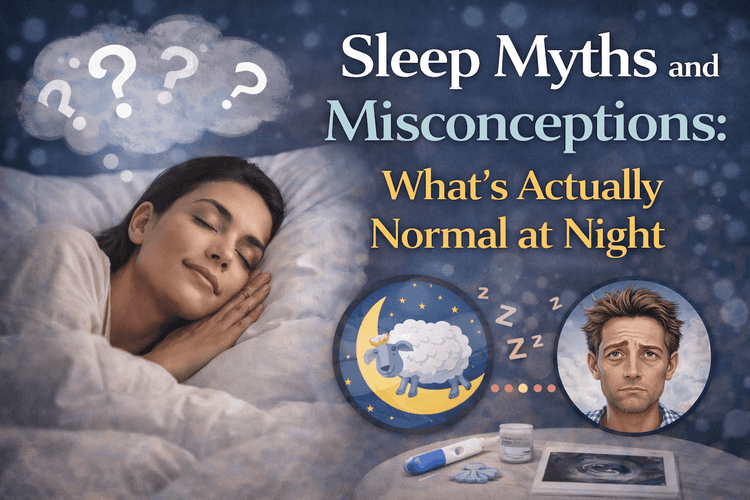1. Por qué es importante un sueño de calidad
Charlie Morley lo expresa de forma sencilla: "El sueño es la cadena de oro que une la salud. Da prioridad al sueño, y la buena salud vendrá por sí sola". Sin embargo, dormir mal se ha extendido tanto que muchos lo aceptan como normal. Pero no lo es. Tener dificultades para conciliar el sueño o despertarse agotado no sólo es frustrante, sino que puede afectarlo todo, desde los niveles de energía hasta el equilibrio hormonal.
El sueño y el bienestar general
Dormir es una habilidad que, una vez dominada, mejora el estado de ánimo, la energía y la claridad mental. Un buen descanso nocturno permite que tu cuerpo se repare, refuerza la inmunidad y regula los niveles de estrés. Por otro lado, dormir mal puede hacer que la vida cotidiana resulte agobiante y provocar problemas de salud a largo plazo.
Cómo afecta el sueño a la fertilidad
La relación entre el sueño y la fertilidad está bien establecida. Los trastornos del sueño pueden alterar la producción hormonal, afectando a los ciclos menstruales y a la calidad del esperma. La falta de sueño eleva los niveles de cortisol, que pueden interferir con las hormonas reproductivas, dificultando la concepción tanto en hombres como en mujeres. En pocas palabras, dormir mejor puede apoyar tu proceso de fertilidad de forma natural.
2. Crear el entorno de sueño perfecto
Una noche reparadora empieza con el entorno adecuado. La luz, el sonido y la temperatura desempeñan un papel clave para garantizar un sueño profundo.
Gestionar la exposición a la luz
Incluso una luz mínima -como la tenue pantalla de un televisor- puede perturbar el sueño. Los estudios demuestran que afecta a los niveles de azúcar en sangre y a la frecuencia cardiaca, impidiendo el descanso profundo. Bloquear todas las fuentes de luz, utilizar cortinas opacas o un antifaz para dormir puede suponer una gran diferencia.
Optimizar el sonido
Algunas personas necesitan silencio, mientras que otras duermen mejor con ruido blanco o sonidos tranquilizadores. Experimenta con lo que mejor te funcione, ya sean sonidos de la naturaleza, ritmos binaurales o música relajante.
Regular la temperatura
Tu temperatura corporal desciende de forma natural por la noche. Mantener tu habitación fresca (pero no demasiado fría) ayuda a evitar que te despiertes incómoda. Evita las mantas pesadas si tiendes a sobrecalentarte o considera la posibilidad de utilizar ropa de cama transpirable.

3. Hábitos que alteran el sueño que debes evitar
Lo que haces antes de acostarte repercute directamente en la calidad de tu sueño. Esto es lo que debes tener en cuenta:
Cafeína, nicotina y alcohol
La cafeína y la nicotina son estimulantes que dificultan conciliar el sueño. Aunque al principio el alcohol puede producir somnolencia, altera los ciclos del sueño, lo que provoca un mal descanso.
Comer tarde por la noche
Comer demasiado cerca de la hora de acostarte obliga a tu cuerpo a hacer la digestión en lugar de prepararse para dormir. Dave Asprey sugiere dejar al menos tres horas entre la última comida y la hora de acostarse para conseguir un sueño profundo óptimo.
Relájate con un ritual calmante.
Una infusión caliente y sin cafeína antes de acostarte puede indicar a tu cuerpo que se relaje. Los tés de manzanilla, raíz de valeriana o lavanda son excelentes opciones para promover el descanso.

4. Descanso y relajación para dormir mejor
El descanso profundo no consiste sólo en dormir, sino en cómo te relajas a lo largo del día. Descanso Profundo sin Dormir (NSDR)
Prácticas como la meditación, el yoga nidra o la relajación guiada pueden ayudar a restablecer tu sistema nervioso, reduciendo el estrés y mejorando la calidad del sueño.
Técnicas de respiración
Muchos de nosotros respiramos superficialmente debido al estrés. La respiración nasal garantiza una mejor oxigenación, favoreciendo un sueño más profundo. Charlie Morley señala que la respiración bucal reduce la absorción de oxígeno, lo que hace que el sueño sea menos reparador. Si es necesario, algunas personas incluso utilizan cinta adhesiva bucal para favorecer la respiración nasal.
Reflexión consciente
Tómate un momento antes de acostarte para conectar contigo misma. ¿Cuál es el último pensamiento que te ronda por la cabeza? Escribir en un diario tres cosas por las que estás agradecida puede cambiar tu mentalidad a un estado positivo y relajado antes de dormir.
A continuación te explicamos cómo optimizar el sueño para mejorar la salud y la fertilidad:
✅ Elimina la contaminación lumínica: Cubre las luces LED, utiliza cortinas opacas o ponte un antifaz para dormir.
✅ Elige sonidos relajantes: Prueba el ruido blanco, los ritmos binaurales o la música relajante.
✅ Monitorea los hábitos nocturnos: Evita la cafeína, el alcohol y las comidas copiosas antes de acostarte.
✅ Prioriza la relajación: Escucha una grabación guiada, practica ejercicios de respiración o prueba el NSDR.
✅ Lleva un Diario del Sueño: Registra tus pautas y anota cómo afectan a tu descanso los distintos hábitos.
Conclusión
Dar prioridad al sueño es uno de los pasos más impactantes que puedes dar para tu salud y tu fertilidad. Mejorando tu entorno de sueño, adoptando mejores hábitos nocturnos e integrando técnicas de relajación, conseguirás más energía, equilibrio y bienestar general.
El sueño de calidad no es un lujo, es una necesidad. Conviértelo en tu máxima prioridad y verás la diferencia en tu vida.






















